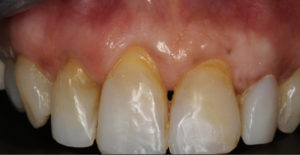December 6, 2018
Have you noticed that your teeth seem longer than normal, or that your gums are pulling back from your teeth? If so, you may have receding gums. Millions of Americans deal with this common dental problem before they even realize they have it. Unfortunately, without gum recession treatment, it can get out of control and require surgery. We have some information we want you to know about what causes gum recession, what to watch for and how it is treated.

What Causes Recession?
Periodontal disease is one of the most common causes of gum recession. Bacteria gathers and thrives in the pockets created when your gums recede. Other common causes include genetics, insufficient oral health care, aggressive tooth brushing, smoking, hormone changes and grinding or clenching teeth.
Signs of Recession
If you fear your gums are receding, watch for several things in addition to changes around the area where the gums meet the teeth. Bad breath, loose teeth, red and swollen gums and a bad taste in your mouth can all be signs of recession. Your bite may also change, and you may have tender, painful gums.
How Is it Treated?
If it’s in the early phases, recession can often be treated with a good professional cleaning by a dentist or periodontist in Venice, FL. These treatments are called scaling and root planing and allow the doctor to clean plaque and tartar from the roots and surface of your teeth.
If the condition is serious, it may be necessary for you to have a surgery known as a gum graft. This helps to restore lost gum tissue by taking it from other spots in the mouth and attaching it to the area where tissue has been lost.
Schedule an Appointment Today
If you are concerned about the health of both your teeth and your gums, schedule an appointment with Dr. Feldman today. It’s our goal to provide the tools for every patient to have a healthy, happy mouth.